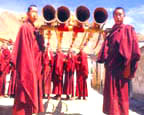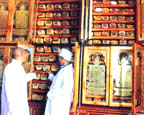|
Chongbu Tsering Dorji, Philosophical Reasons of the Tibetan Ethnic Group, Gansu Ethnic Publishing House, Lanzhou, July 1996. 238 pp. Illus.19 cm. ISBN 7-5421-0453-5. Nine theses on comparative study of the Tibetan and the Western philosophy, covering Tibetan and Western thinkers, Tibetan Hetuvidya and Western formal logic, and the historical evaluation of the Tibetan philosophical system an d that of the West; assessment and prospects of the Tibetan philosophy at the turn of the century, including thoughts on the social position and future of Tibet an philosophy.
Panpan Dorje, Gain a Thorough Understanding of the Esoteric Buddhist Teachings Philosophical State of Tibetan Buddhism, Qinghai People's Publishing House, Xining, September 1996. 319 pp. 20 cm. ISBN 7-225-01149-9. Cultural Phenomena of Tibetan Buddhism Series. Analysis and elaboration of the basic contents, systematic structure, characteristics, theoretical sources and ideological changes of the doctrines of the Nyingma, Sakya, Gelug and Jonang sects and other sects from the religious, cultural and philosophical angles. Chongbu Tsering Dorje, New Thinking Trend: Thoughts on the Quest for Tibetan Buddhism, Tibetan People's Publishing House, Lhasa, September 1999. 334 pp. 20 cm. ISBN 7-223-01 245-5. Fourteen theses by Chongbu Tsering Dorje, a contemporary young Tibetan scholar, on comparative study on the philosophy of Tibetan Buddhism and that of the West from different aspects, covering many viewpoints that merit readers attention.
Sangdrup, Tibetan Psychology, Ethnic Publishing House, Beijing, June 1997. 276 pp. 20 cm. ISBN 7-105-02627-8. Basically retaining the traditional psychological structure of the Tibetan ethnic group, and a detailed introduction to the emergence, development and social position of Tibetan psychological theory and an analysis, on the theoretical plane, of some psychological phenomena in Tibetan social life.
Hetuvidya (Buddhist Logic)
Gedun Trupa (First Dalai Lama), Outline of Tibetan Hetuvidya, Gansu Ethnic Publishing House, Langzhou, December 1996. 487 pp. 20 cm. ISBN 7-5421-0484-5. Originally titled Theory of Pratyaksapramana, written in the 15th century, an annotation on "Pramanavarttika Karika" by Dharmakirti, an Indian Buddhist scholar, this book and Annotations on t he "Seven Treatises on Hetuvidya" by Khedrupje Geleg Pasang, the First Panchen Lama, are considered the representative works of Tibetan Hetuvidya. Based on the block edition of Labrang Monastery.
Jime Sangdrup, The Origin and Theoretical Exploration of the Hetuvidya, China Tibetology Publishing House, Beijing, July 1996 . 443 pp. 20 cm. ISBN 7-80057-271-4. Four chapters: introduction to two Hetuvidya schools in ancient India before the emergence of Buddhism in the first chapter; emergence and development of Indian Buddhist Hetuvidya in the second chapter; the spread and main representatives of Hetuvidya in different periods in Tibet in the third chapter; and the basic theoretical system and scope of Hetuvidya in the fourth chapter. With a recommendation article by Dunggar Lobsang Chilai.
Gedun Sangmten and Tsering Tso, Basic Knowledge of Tibetan Hetuvidya Logic, Gansu Ethnic Publishing House, Lanzhou, May 1996. 276 pp. 20 cm. ISBN 7-5421-0433-0. A guidebook to one of the five classics of Exoterism, the "Pramana varttika Karika" Hetuvidya, and a simple exposition to Bsdus-ra.
Banchen Soinen Zhagba, Pramanavarttika Karika: A Clear Explanation, China Tibetology Publishing House, Beijing. March 1998. 526 pp. 26 cm. ISBN 7-80057-298-6. Hardcover. Gems of Snowland Culture Series. In this book the author, the 15th Ganden Tripa (1428-1544), gives a sentence-by-sentence interpretation to "Pramanavarttika Karika." With an article "Outline of Religious Sects: Tree to Please the Brilliant Person" attached, giving a general account of ancient Indian Buddhism and other religious sects.
Langrin Ngawang Phuntso, New Annotations on "Pramanavarttika Karika" (two volumes), Tibetan People's Publishing House, Lhasa, December 1997. 542 pp and 671 pp. 20 cm. ISBN 7-223-01074-6. "Pramanavarttika Karika" is one of the masterworks of Tibetan Hetuvidya written by the Indian Buddhist scholar Dharmakirti. Five editions of annotations on it have been listed in Catalogues of Chinese Publications in Tibetan Studies (1949-1991 and 1992-1995). A modern Tibetan scholar, the author of this book gives new annotations to the four parts of the origin al book on the basis of many years study. The handwritten original of the book is by the author himself.
Sakban Gonggar Gyaincain, et al, Detailed An [J P]notations to the "Precious Theory of Pratyaksapramana," Sichuan Ethnic Publishing House, Chengdu, April 1998. 773 pp. 20 cm. ISBN 7-5409-1389-4. Pratyaksapramana is one of the Five Major Treatises of Buddhist Doc trine in traditional Tibetan culture. Precious Theory of Pratyaksapra mana is listed in the Catalogue of Chinese Publications in Tibetan Studies (1949-1991) with annotations by Sakban Gonggar Gyaincain. This book contains two more annotations on the Precious Theory of Pratyaksapramana, one by Goranba Sonam Sangge (1429-1469) and the other by Jamyang Lode Wanpo.
Qi Shunlai, An Introduction to Tibetan Hetuvidya, Qinghai Ethnic Publishing House, Xining, August 1998. 588 pp. 20 cm. ISBN 7-5420-0690-8. A Tibetan Hetuvidya textbook for universities and colleges, compiled on the basis of the masterpieces of Hetuvidya,such as "Pramanasamuccaya" and "Seven Treatises on Hetuvidya." Five chapters. First chapter: elaboration of the concepts and history of Hetuvidya and logic; second, third and fourth chapte rs: based on On Bsdus-ra, the Treasured Lamp to the General Meaning by Pandawa Tubten Geleg Gyatso and the Collection of Knowledge of the Mind and Benevolence Sayings by Chamchin Monastery, elaborating the object of the mind knowledge, the knowledge of the mind and relationship between the mind knowledge and its object; fifth chapter: explanation of the logic.
Gungthang Lochi Gyatso and Barang Gonjo Qoinpe, A Collection of Theses on Hetuvidya by Master Guangthang Lochi Gyatso, Gansu Ethnic Publishing House, Lanzhou, February 1999, 461 pp. 20 cm. ISBN 7-5 421-0633-3. Selected Tibetan Ancient Books Seriess. Four theses, two by Gungthang Lochi Gyatso (1851-1930), including Analysis of Syllogism and two by Barang Gonjo Qoinpe, including Introduction to Syllogism.
|



